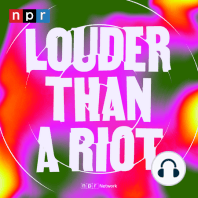52 min listen
The Badder, The Better: Bobby Shmurda (Pt 1)
ratings:
Length:
53 minutes
Released:
Nov 5, 2020
Format:
Podcast episode
Description
Just like his legendary disappearing hat, Brooklyn rapper Bobby Shmurda's career was on the rise in 2014. But so was the evidence in a murder case against his crew, GS9. In the first of three episodes exploring Bobby's story, we look at his come-up through the eyes of former Epic Records exec Sha Money XL, who guided Bobby on his tightrope walk from the streets to superstardom. What happens when the industry capitalizes on a criminal persona? And do record execs have the juice to back Bobby up when things get too hot?
Released:
Nov 5, 2020
Format:
Podcast episode
Titles in the series (28)
The Conspiracy Against Hip-Hop: Why are hip-hop and mass incarceration so entangled in America? How did they become that way? A mysterious letter sends us back in time to find out. by Louder Than A Riot
